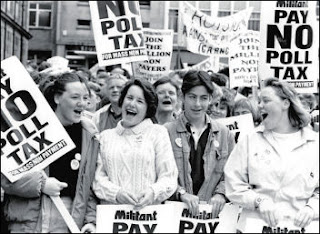THE NEW POLL TAX?

What, if anything, will bring down the Coalition Government? What will be its Poll Tax moment?
I've been reading about the Kubler-Ross model of how people deal with tragedy or grief. In 1969, Elisabeth Kubler-Ross wrote a book called On death and dying, in which she described the five stages by which people react to bereavement or the diagnosis of a terminal illness. First, people try to deny that the tragedy occurred. Second, upon accepting that it has occurred, a person may be angry, raging against a world that has allowed it to happen. Third, a person will try to make the best of it, hoping they can prolong life, or that they can reverse their terminal illness in exchange for living a better, more worthy life. Fourth, they become resigned, fatalistic, depressed and nihilistic - this is how things are, they might say, so what's the point in doing anything? And finally, the person comes to terms with the situation, fully accepting that the end is nigh.
This model fits the tragedies which Kubler-Ross was describing, because they are truly irreversible. But can it fit a political tragedy? At what stage are the millions of people who work in or rely on public services, whether they realise it or not? The denial stage has passed - partly because their worst fears of what the CSR might bring have been realised, and partly because public services have been subject to various efficiency drives for many years. Denial is no longer an option, and the Government no doubt hopes that the public will skip the second stage.
Maybe they are right. But if they are, what are the possible outcomes? That people who have been made redundant will exchange the wasteful years of public servitude for private entrepreneurialism? The news that Britain's economic growth remains extremely shaky suggests otherwise. Will people who can no longer afford the rent on their Council flat move to less desirable areas without a fight? Perhaps, but then how will Councils outside London and the South East cope? Will people who are out of work, pushed even further from the labour market by a thoroughly confused and botched set of welfare reforms, turn to nihilism rather than radicalism? Again, maybe - but this would spell the political death of the Coalation.
But I don't think they are right. The budget cuts are so comprehensive, and so kamikaze, that I think many people from many walks of life will become very angry, and for very different reasons. Among this plethora of resentments, which will be the one that kills off the Government? It is too early to tell, and there is an embarrassment of options to choose from.
But Tom Clark suggests one cut that has largely escaped the notice of journalists and, I suspect, the public. The Government has handed responsibility for Council Tax rebates to Local Authorities, and has deliberately given them less money than the Government believes is necessary:
"The Institute for Fiscal Studies suggests that one way councils could respond to the funding shortfall would be to withdraw council tax benefit much more rapidly as families begin to earn. On the basis of their modelling, I calculate that the effective tax rate that some poor workers face as their benefits are withdrawn would rise to 98%. Some local authorities will respond in other ways creating new perversities, and with different perversities in different parts of the country, IDS's £2bn overhaul of the benefit system to create nationwide rationalisation that makes it pay to work becomes outright impossible.
A final flaw in the half-baked plan is that it will reward councils who drive the poor out of their town. Just as new housing policies purging them from well-to-do districts are coming on stream, councils could find they are quids in if they can persuade people entitled to a rebate to get out of the borough. Shirley Porter, the council leader who pushed the poor from Westminster in the 1980s, would approve wholeheartedly."

0 Comments:
Post a Comment
<< Home